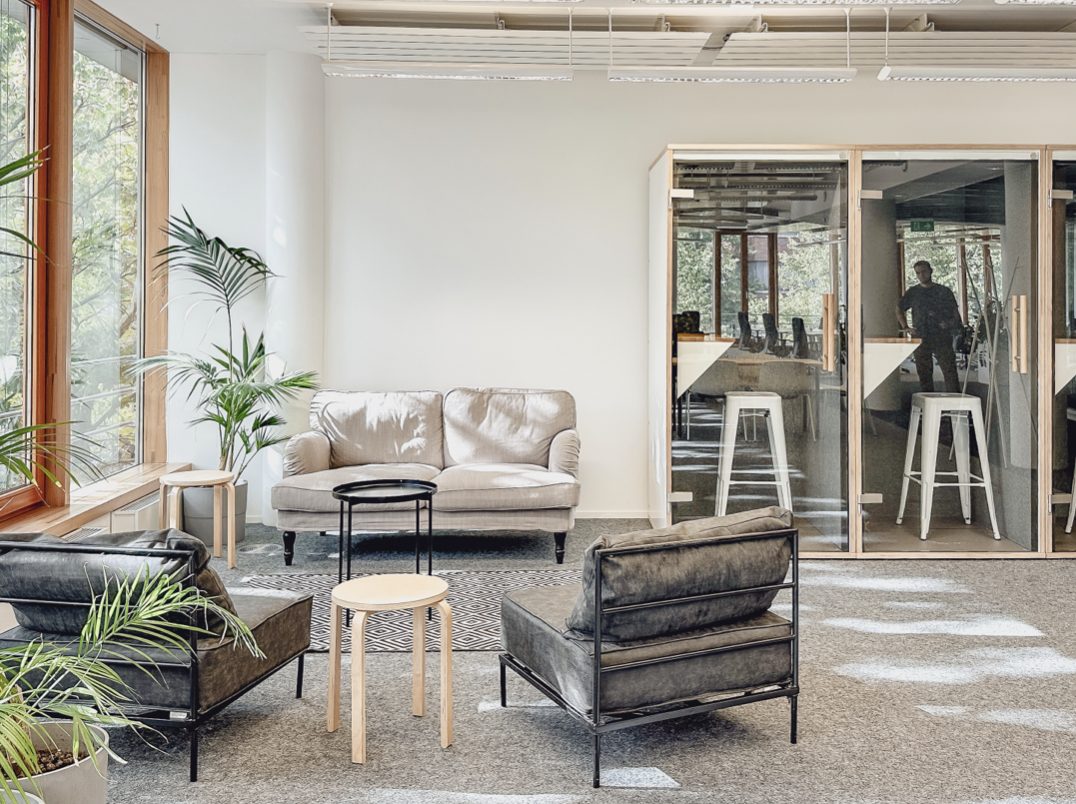
Back
Berlin's AI Boom: How Fast-Growing Artificial Intelligence Companies Are Reshaping Office Demand
Start Up Ecosystem
October 13, 2025
•

The Numbers Behind Berlin's AI Revolution
Berlin has emerged as Europe's undisputed artificial intelligence capital, hosting more AI companies than any other German city. The statistics paint a picture of explosive growth that's reshaping not just the tech landscape, but the entire commercial real estate market in the German capital.
Explosive Growth in AI Company Formation
Germany's AI startup ecosystem has grown by an impressive 35% year-over-year, reaching approximately 687 AI companies nationwide in 2024. Berlin dominates this landscape with 209 AI companies, significantly outpacing Munich's 136 AI firms. This concentration represents more than 30% of Germany's entire AI ecosystem, creating a powerful cluster effect that continues to attract new companies and talent.
The growth trajectory shows no signs of slowing. Industry analysts predict that Berlin could host over 300 AI companies by 2026, driven by continued investment, government support, and the city's reputation as Europe's startup capital. This rapid expansion is creating unprecedented demand for office space tailored to AI companies' unique needs.
Investment Fueling Office Expansion
The financial backing behind Berlin's AI companies is substantial, with total investment in the sector exceeding €2 billion in recent years. This funding influx directly translates to office market activity, as companies use capital to expand their teams and upgrade their facilities. Notable funding rounds have enabled companies to move from shared coworking spaces to dedicated headquarters, often requiring 5-10 times more office space.
Investment Impact on Office Demand:
•Seed-funded companies typically require 200-500 sqm of flexible space
•Series A companies often expand to 800-1,500 sqm with dedicated facilities
•Series B+ companies frequently need 2,000+ sqm with specialized infrastructure
•Unicorn-status companies may require 5,000+ sqm across multiple locations
What Makes AI Companies Different: Unique Office Requirements
AI companies have fundamentally different office needs compared to traditional businesses, driven by their technology requirements, talent expectations, and rapid scaling patterns. Understanding these unique requirements is crucial for both landlords and office providers in Berlin's competitive market.
Technology Infrastructure Demands
High-Performance Computing Needs: AI companies require robust IT infrastructure to support machine learning workloads, data processing, and model training. This translates to higher electrical capacity, advanced cooling systems, and redundant internet connections.
Data Security Requirements: Many AI companies handle sensitive data or proprietary algorithms, necessitating enhanced security measures including biometric access controls, secure server rooms, and compliance with GDPR and other data protection regulations.
Collaboration Technology: AI development is highly collaborative, requiring advanced video conferencing systems, interactive displays, and seamless integration between physical and remote team members.
Scalable Network Architecture: As AI companies grow rapidly, their network needs can change dramatically. Offices must support easy scaling of IT infrastructure without major renovations.
Workspace Design for Innovation
Open Collaboration Areas: AI development thrives on cross-functional collaboration between data scientists, engineers, and product teams. Modern AI offices feature large, flexible spaces that can be reconfigured for different project needs.
Quiet Focus Zones: Despite the collaborative nature of AI work, individual contributors need quiet spaces for deep work on complex algorithms and data analysis. This requires careful acoustic design and varied workspace types.
Experimentation Labs: Many AI companies, particularly those working on robotics or hardware integration, require specialized lab spaces for testing and prototyping. These areas need flexible power, specialized ventilation, and easy reconfiguration.
Presentation and Demo Spaces: AI companies frequently host investor meetings, client demonstrations, and technical presentations. Purpose-built presentation spaces with advanced AV capabilities are increasingly important.
Talent Attraction and Retention Features
Lifestyle Amenities: Berlin's AI talent pool is highly competitive, and companies use office amenities to attract and retain top performers. This includes fitness facilities, game rooms, high-quality catering, and wellness spaces.
Flexible Work Arrangements: Many AI professionals expect hybrid work options, requiring offices that support both in-person collaboration and remote work integration.
Learning and Development Spaces: The rapidly evolving AI field requires continuous learning. Companies increasingly include dedicated spaces for training, workshops, and knowledge sharing.
International Appeal: Berlin's AI companies attract global talent, requiring offices that appeal to international professionals and support diverse working styles.
District Preferences: Where AI Companies Choose to Locate
Berlin's AI companies show distinct preferences for certain districts, driven by factors including talent accessibility, cost considerations, ecosystem proximity, and company stage. These location patterns are creating AI clusters that influence office market dynamics across the city.
Mitte: The Enterprise AI Hub
Berlin-Mitte has become the preferred location for established AI companies and those targeting enterprise clients. The district's prestige, transport connectivity, and proximity to corporate headquarters make it attractive for AI companies in their growth and maturity phases.
Why AI Companies Choose Mitte:
- Proximity to potential enterprise clients and partners
- Prestigious addresses that enhance credibility with investors
- Excellent transport links for international business travel
- Access to government institutions for regulatory discussions
- High concentration of venture capital firms
Office Market Impact: AI companies in Mitte typically pay premium rents (€35-50/sqm) but require high-quality, fully-serviced spaces with advanced technology infrastructure.
Kreuzberg: The AI Startup Laboratory
Kreuzberg continues to attract early-stage AI startups and research-focused companies. The district's creative atmosphere, international community, and lower costs make it ideal for companies in their experimental phases.
Startup-Friendly Factors:
- Lower office costs allowing more budget for R&D and talent
- Vibrant startup ecosystem facilitating collaboration and knowledge sharing
- Proximity to technical universities and research institutions
- International talent pool attracted to the district's culture
- Flexible office options including coworking and short-term leases
Office Market Impact: Demand for flexible, affordable spaces (€25-35/sqm) with good collaboration facilities and room for rapid scaling.
Friedrichshain: Industrial AI and Deep Tech
Friedrichshain is emerging as a hub for AI companies focused on industrial applications, robotics, and hardware integration. The district's industrial heritage and growing tech infrastructure make it attractive for companies requiring specialized facilities.
Industrial AI Advantages:
- Access to industrial spaces suitable for hardware development
- Growing community of deep tech and hardware startups
- Proximity to technical infrastructure and logistics networks
- More affordable options for companies requiring large spaces
- Emerging ecosystem of manufacturing and IoT companies
Office Market Impact: Demand for larger, more industrial spaces (€22-32/sqm) with specialized infrastructure for hardware development and testing.
Charlottenburg: B2B AI Solutions
Charlottenburg attracts AI companies focused on business-to-business solutions and enterprise software. The district's established business environment and corporate proximity make it suitable for AI companies with traditional sales models.
B2B AI Benefits:
- Established business district with corporate client base
- Professional environment suitable for enterprise sales
- Good connectivity to other German business centers
- Access to traditional industries seeking AI transformation
- Established support services for business operations
Office Market Impact: Demand for professional, well-equipped spaces (€28-38/sqm) suitable for client meetings and enterprise sales activities.
The Evolution of AI Office Spaces: From Startups to Scale-ups
AI companies' office needs evolve dramatically as they grow, creating distinct phases of office requirements that impact Berlin's commercial real estate market. Understanding these phases helps explain current demand patterns and predict future market needs.
Phase 1: Early Stage (0-20 employees)
Typical Office Needs:
- 200-500 sqm of flexible space
- Coworking or shared office arrangements
- Basic IT infrastructure with room for upgrades
- Collaborative spaces for small team meetings
- Cost-effective solutions with short-term flexibility
Market Impact: High demand for coworking spaces and flexible office solutions in startup-friendly districts like Kreuzberg and Friedrichshain.
Phase 2: Growth Stage (20-100 employees)
Typical Office Needs:
- 800-2,000 sqm of dedicated space
- Mix of open collaboration areas and private offices
- Enhanced IT infrastructure for larger datasets
- Specialized spaces for different team functions
- Room for rapid team expansion
Market Impact: Increased demand for mid-size office spaces with flexible lease terms and expansion options.
Phase 3: Scale-up (100-500 employees)
Typical Office Needs:
- 2,000-5,000 sqm across potentially multiple locations
- Sophisticated IT and security infrastructure
- Specialized facilities (labs, demo rooms, training centers)
- Executive offices and formal meeting spaces
- Employee amenities and retention features
Market Impact: Competition for large, high-quality office spaces in prime locations, often driving up rents in preferred districts.
Phase 4: Mature Company (500+ employees)
Typical Office Needs:
- 5,000+ sqm, often across multiple buildings or cities
- Campus-style environments with diverse facility types
- Enterprise-grade infrastructure and security
- Extensive amenities and employee services
- Potential for custom-built or heavily customized spaces
Market Impact: Major influence on large office developments and potential catalyst for new construction projects.
Technology Infrastructure: The Hidden Driver of Office Selection
The technology requirements of AI companies often determine their office choices more than traditional factors like location or aesthetics. These infrastructure needs are creating new categories of "AI-ready" office spaces in Berlin's market.
Power and Cooling Requirements
AI workloads, particularly machine learning training, require significantly more electrical power than traditional office work. A typical AI company may need 2-3 times the electrical capacity of a conventional office tenant. This includes:
High-Density Computing: GPU clusters and high-performance servers generate substantial heat, requiring advanced cooling systems that many older office buildings cannot support.
Redundant Power Systems: AI companies often require uninterruptible power supplies and backup generators to protect against data loss during power outages.
Scalable Electrical Infrastructure: As AI companies grow, their computing needs can increase exponentially, requiring electrical systems that can be easily upgraded.
Connectivity and Network Infrastructure
Ultra-High-Speed Internet: AI companies require internet connections far exceeding typical business needs, often demanding dedicated fiber connections with speeds of 1 Gbps or higher.
Low-Latency Connections: Real-time AI applications require minimal network latency, influencing office location decisions based on proximity to internet exchange points.
Secure Network Architecture: AI companies handling sensitive data require sophisticated network security infrastructure, including isolated networks and advanced firewall systems.
Data Storage and Processing
On-Premise Server Requirements: Many AI companies require dedicated server rooms with specialized environmental controls, security systems, and expansion capabilities.
Cloud Integration: Offices must support seamless integration with cloud computing platforms, requiring robust and redundant internet connections.
Data Backup and Recovery: AI companies need sophisticated backup systems to protect valuable datasets and trained models.
Flexible Work Models: How AI Companies Are Redefining Office Use
The AI industry has been at the forefront of adopting flexible work models, influenced by the global nature of AI talent and the collaborative requirements of AI development. These trends are significantly impacting office space utilization and design in Berlin.
Hybrid Work Adoption
Remote-First Policies: Many AI companies have adopted remote-first policies, using their Berlin offices primarily for collaboration, meetings, and team building rather than daily individual work.
Flexible Scheduling: AI development often involves irregular hours due to long training runs and global collaboration, requiring offices that support 24/7 access and flexible usage patterns.
Project-Based Space Allocation: AI teams often work in project-based sprints, requiring office spaces that can be quickly reconfigured for different team compositions and project needs.
Impact on Office Design
Collaboration-Focused Layouts: With individual work increasingly done remotely, AI company offices emphasize collaborative spaces, meeting rooms, and social areas over individual desks.
Hoteling and Hot-Desking: Many AI companies implement desk reservation systems, allowing them to maintain smaller office footprints while accommodating larger teams when needed.
Multi-Purpose Spaces: Offices are designed with flexible spaces that can serve multiple functions - from all-hands meetings to hackathons to client presentations.
Technology Integration for Hybrid Work
Advanced Video Conferencing: Every meeting space requires high-quality video conferencing capabilities to seamlessly integrate remote team members.
Digital Collaboration Tools: Offices feature interactive displays, digital whiteboards, and other tools that bridge physical and digital collaboration.
Seamless Device Integration: Workspaces support easy connection of personal devices and laptops, reducing the need for assigned desktop computers.
Investment Patterns and Office Market Impact
The investment flowing into Berlin's AI sector is directly driving office market activity, creating new demand patterns and influencing development decisions across the city.
Funding Rounds and Office Expansion
Seed to Series A Growth: Companies typically expand their office space by 3-5x when moving from seed to Series A funding, creating predictable demand for mid-size office spaces.
International Expansion: Well-funded AI companies often establish Berlin as their European headquarters, creating demand for larger, more sophisticated office spaces.
Acquisition Activity: As larger tech companies acquire Berlin AI startups, they often need to integrate or expand office facilities, creating additional market activity.
Geographic Investment Patterns
Venture Capital Concentration: The concentration of VC firms in Mitte and surrounding areas influences where funded AI companies choose to locate, creating clustering effects.
Government Funding Impact: Public funding programs often favor companies in specific districts or development zones, influencing location decisions.
Corporate Venture Capital: Large corporations investing in AI startups often prefer companies located near their own offices, creating additional clustering effects.
Talent Competition and Office Strategy
The intense competition for AI talent in Berlin is driving companies to use office location and design as key differentiators in recruitment and retention strategies.
Talent Attraction Through Office Design
Showcase Spaces: AI companies increasingly use their offices as recruitment tools, creating impressive spaces that demonstrate company culture and success to potential hires.
Amenity Arms Race: Competition for talent has led to an escalation in office amenities, from high-end catering to fitness facilities to on-site childcare.
Location Accessibility: Companies prioritize office locations that are easily accessible to Berlin's diverse talent pool, often choosing areas with excellent public transport connections.
Retention Through Environment
Flexible Work Environments: Offices that support different working styles and preferences help retain diverse AI talent with varying needs and preferences.
Learning and Development Facilities: Companies invest in spaces for continuous learning, recognizing that AI professionals need to constantly update their skills.
Social and Community Spaces: Offices that foster community and social interaction help retain talent in an industry where remote work is common.
Sustainability and Future-Proofing
Berlin's AI companies are increasingly focused on sustainability, both in their technology and their office choices. This trend is influencing office selection criteria and driving demand for green building features.
Environmental Considerations
Energy Efficiency: The high power consumption of AI workloads makes energy-efficient buildings particularly attractive to AI companies seeking to minimize their environmental impact.
Renewable Energy: Companies increasingly prefer offices powered by renewable energy sources, both for environmental and cost reasons.
Sustainable Transportation: Office locations with good public transport and cycling infrastructure support companies' sustainability goals and employee preferences.
Future-Proofing Office Investments
Adaptable Infrastructure: AI companies prefer offices with infrastructure that can adapt to changing technology needs without major renovations.
Scalable Systems: Building systems that can easily scale up or down help companies manage uncertain growth trajectories.
Technology Integration: Offices with built-in smart building features and IoT integration appeal to AI companies comfortable with advanced technology.
Market Predictions: The Future of AI Office Demand in Berlin
Based on current growth trends and industry developments, several predictions emerge for Berlin's AI office market over the next 3-5 years.
Continued Growth and Expansion
Market Size Projections: Industry analysts predict Berlin's AI sector could grow to 300+ companies by 2026, potentially requiring an additional 500,000+ sqm of office space.
Geographic Expansion: As prime locations in Mitte and Kreuzberg become saturated, AI companies will likely expand into adjacent districts, potentially driving development in areas like Wedding and Neukölln.
Vertical Specialization: Expect to see AI clusters forming around specific verticals (automotive AI, fintech AI, industrial AI) in different parts of the city.
Infrastructure Development
AI-Ready Buildings: Developers will increasingly market "AI-ready" buildings with enhanced power, cooling, and connectivity infrastructure.
Specialized Facilities: Growth in demand for specialized facilities like AI training centers, robotics labs, and data processing facilities.
Smart Building Integration: Increased integration of AI and IoT technologies in office buildings themselves, creating synergies with AI tenant companies.
Market Dynamics
Rent Pressure: Continued growth in AI companies will likely drive up rents in preferred locations, potentially pushing early-stage companies to explore new districts.
Development Activity: Expect increased development activity targeting AI companies, including purpose-built facilities and major renovations of existing buildings.
Service Evolution: Growth in specialized services for AI companies, including AI-focused coworking spaces, specialized IT support, and industry-specific amenities.
Setting.io: Navigating Berlin's AI Office Market
The rapid growth and unique requirements of Berlin's AI sector create both opportunities and challenges for companies seeking office space. Setting.io's deep understanding of both the AI industry and Berlin's office market makes us the ideal partner for AI companies at every stage of growth.
Specialized AI Company Services
Technology Assessment: We help AI companies evaluate office spaces for their specific technology requirements, from power and cooling to network infrastructure.
Growth Planning: Our experience with AI company growth patterns helps clients choose offices that can accommodate rapid scaling without frequent relocations.
District Expertise: We provide detailed insights into Berlin's AI clusters, helping companies choose locations that align with their business model and growth stage.
Flexible Solutions: We specialize in flexible office arrangements that match the dynamic needs of AI companies, from coworking to custom build-outs.
Market Intelligence and Insights
Trend Analysis: Regular market reports on AI company office trends, rental rates, and availability in key districts.
Peer Benchmarking: Insights into how similar AI companies have approached their office strategies and what lessons can be learned.
Future Planning: Guidance on how to future-proof office decisions as AI technology and business models continue to evolve.
Investment Coordination: Support for coordinating office expansion with funding rounds and business milestones.
Conclusion: Berlin's AI Future is Being Built Today
Berlin's artificial intelligence boom represents more than just a technology trend - it's a fundamental shift that's reshaping the city's office market and urban development patterns. The 209 AI companies currently calling Berlin home are just the beginning of a transformation that will define the city's economic future.
The unique requirements of AI companies - from advanced technology infrastructure to flexible collaboration spaces - are driving innovation in office design and creating new categories of commercial real estate. As these companies grow from startups to scale-ups to global leaders, their evolving office needs will continue to influence Berlin's development patterns and investment flows.
For AI companies entering or expanding in Berlin, understanding these market dynamics is crucial for making strategic office decisions that support both immediate needs and long-term growth. The right office location and design can be a competitive advantage in attracting talent, impressing investors, and building company culture.
Berlin's position as Europe's AI capital is not just about the companies that are here today, but about creating the infrastructure and ecosystem that will support the next generation of AI innovation. The office choices being made now by Berlin's AI companies are laying the foundation for the city's continued leadership in artificial intelligence.
As the AI revolution continues to unfold, Berlin's office market will continue to evolve to meet the changing needs of this dynamic industry. Companies that understand these trends and work with experienced partners like Setting.io will be best positioned to thrive in Berlin's competitive AI ecosystem.
The future of artificial intelligence is being built in Berlin's offices today, and the companies that choose their workspace strategically will be the ones that shape tomorrow's AI landscape.





